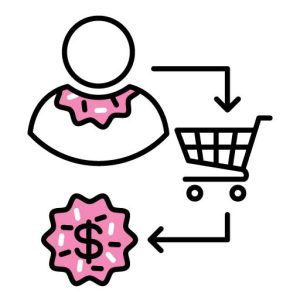There are several reasons why you might choose to use an e-commerce platforms :
- Convenience: With an e-commerce platform, you don’t have to worry about building and maintaining your own website, which can be time-consuming and technically challenging. Those platforms handle all of the technical aspects of running an online store, so you can focus on running your business.
- Features: E-commerce platforms like Shopify offer a wide range of features to help you manage and grow your online store. These features can include tools for managing inventory, processing payments, tracking orders, and analyzing sales data.
- Integration: a good platform integrates with a variety of tools and services, making it easier to connect your online store to other systems you might use, such as email marketing platforms, accounting software, and shipping carriers.
- Security: usually these are secure platforms that uses industry-standard security measures to protect your online store and your customers’ data.
- Support: a good platform offers 24/7 customer support, so you can get help whenever you need it.
Here are the most popular and acceptable platforms in the Industry :
- Shopify
Shopify’s e-commerce platform is the most popular platform – Over 4.1 million ecommerce sites are built with Shopify. Shopify is used by online sellers in over 175 countries around the world,lets users build out their storefronts and create product pages. It also provides email marketing, search engine optimization tools and CRM features for audience segmentation and personalization. Users can easily set up Shopify’s platform and sell through various channels, like point of sale products. It offers customizable templates so users can create stores that reflect their company’s branding. Pricing starts at $29 per month for the Basic Shopify plan.
- HubSpot
HubSpot is primarily used for CRM. As we know CRM stands for customer relationship management. It is a term that refers to practices, strategies, and technologies that companies use to manage and analyze customer interactions and data throughout the customer lifecycle, with the goal of improving business relationships with customers, assisting in customer retention and driving sales growth.
CRM systems are designed to collect and store customer data, such as contact information, purchase history, and interactions with the company (through email, phone calls, social media, and other channels). This data is then used to create a comprehensive view of each customer, which can be used to tailor marketing efforts and provide better customer service. The HubSpot platform consists of a hub for marketing automation, sales hub for CRM, service hub for customer service, a hub for content management that enables personalized webpages and an operations hub. Organizations can build websites, sell subscriptions and services, and update product information as needed.
HubSpot offers a free version of its tools, and pricing starts at $45 per user, per month for the CRM Suite bundle. Users can also create their own customized bundles of the different hubs.
- Omnisend
Omnisend main promise is that you can shortcut to revenue growth with it’s easy-to-use platform for ecommerce email marketing, SMS and automation.
Start free is an email marketing platform that also includes the ability to send text messages to customers. It offers integration with other platforms like Shopify, BigCommerce and WooCommerce, and lets its customers use segmentation to send marketing messages based on location, shopping behavior, activity on campaigns or other parameters.
Omnisend’s platform is easy to set up and offers various templates and analytics. The vendor also has a responsive customer service team.
Omnisend offers a free plan with limited sending capabilities, and pricing starts at $16 per month for paid plans.
- WooCommerce
WooCommerce is a customizable, open-source eCommerce platform built on. The platform can integrate with different payment gateways like Stripe and PayPal, as well as with email marketing platforms like MailChimp. It offers both paid and free themes to help build out stores. WooCommerce is fast and easy to set up. Many major hosting companies also support this platform. However, its third-party extensions can get expensive, and it requires some technical knowledge to set up properly. Many features of WooCommerce are free to use, and pricing for third-party extensions varies by developer.
- Wix
Wix started as a platform that enables you to build a website. In thre second phase of company’s evolution they decided to join the huge e commerce category. Now It includes email marketing and integration with social media platforms, as well as templates to build storefronts and product pages. Wix’s drag-and-drop builder simplifies website building, and the vendor’s customer support is helpful and responsive.
What about Pricing ? that’s friendly – starts at $27 per month for the Business Basic plan.
- BigCommerce
An Open SaaS solution combines excellent SaaS and API enabled openness and flexibility, giving any store the needed tools to customize faster. Flexibility , Scalability for the global shift to online purchasing, Speed and agility to protect and grow more sales, Essential back office integrations, No proprietary blockers, . BigCommerce offers a visual page builder, WordPress integration and B2B marketing segmentation. Users can create customer groups, sell in multiple online marketplaces like Amazon and use headless commerce with their preferred front end.
The vendor’s customer service team is very responsive, and users can integrate the platform with many different third-party tools. The platform also offers useful CRM features. However, extensive customization can be costly, and its inventory management is lacking.
